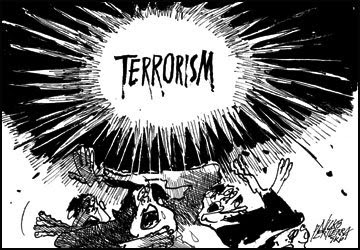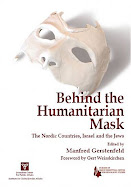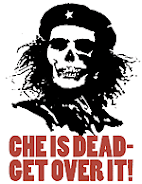Never give an inch!
Theodor Dalrymple in Front Page Magazine
When I was a prison doctor, not a few prisoners would demand tranquillizers from me, claiming to be so agitated that they would soon kill someone if they were not calmed down.
This was the kind of blackmail to which some of the doctors, especially the younger ones, did give in; but I quickly learned that it was both morally wrong and inexpedient in practice to do so.
The conversations would go something like this:
‘I need my valium, doctor.’
‘Why?’
‘I’m all wound up.’
‘What about?’
‘If I don’t get my valium, I’ll kill someone.’
‘I advise you very strongly not to.’
‘If I don’t get valium and I kill someone, it’ll be on your conscience.’
‘No it won’t. It is you who will be guilty. I am not responsible for your actions.’
If the man persisted in his threat, I assured him that I should still eat my dinner and sleep soundly even if he carried out his threat. (I appeared firmer than I felt. I had little doubt that if he did commit a murder, not my conscience but the official enquiry afterwards would blame me, because officialdom and professionals are now deemed to be in loco parentis to all those who come under their purview, and therefore responsible for their actions.)
No man did carry out his threat, however; and I knew from experience that if I gave in to their blackmail I would never hear the end of it.
In writing a prescription, I would have created a rod with which to beat my own back: before long, the man would return, claiming that the amount I had prescribed was insufficient to ‘hold’ him, that he needed more, and for longer, indeed for ever; and the ensuing scenes in my office would grow ever more desperate and threatening. I discovered that the best policy was to let your nay be nay, as the Good Book puts it; indeed, I became known as ‘Dr No,’ and in time the threats died out. I sought not popularity, which in those circumstances, as in so many others, is akin to contempt, but respect; a reputation for doing all in my medical power to assist the genuinely ill and suffering, allied to an absolute refusal to be led down any garden path.
Let us now turn from the sublime (prison) to the ridiculous (the British government). In its wisdom, that august institution declared that the Dutch member of parliament, Geert Wilders, who is invariably designated as being of the far-right, a prohibited immigrant, and refused him entry into our green and pleasant land. The Mother of Parliaments is fast turning into the Step-mother of Parliaments.
As everyone knows by now, Mr. Wilders made a short film called Fitna (Struggle), arguing in a powerful rhetorical way a causative connection between certain verses in the Koran and brutal acts of modern terrorism. The film is uncompromising, to put it mildly; and whether or not Mr. Wilders’ interpretation of the verses is correct, few could deny that at least some Moslems have taken it to be correct. They have differed from Mr. Wilders only in their moral evaluation of the injunctions that they have both found in them. He thinks cutting off the heads of unbelievers is a bad thing, they think it a good thing.
Those who argued for the exclusion of Mr. Wilders from our haven of peace and prosperity claimed that his presence would stir up trouble, perhaps even violence, and that (therefore) he and his film constituted an incitement to hatred.
This, of course, is ludicrous. I have no doubt that Mr. Wilders despises Islam; he probably thinks that its prophet, far from being a model for mankind, is presented as a man with many and serious faults; its holy book a derivative mish-mash with bad passages thrown in, practically unreadable to all but believers; its influence in the world wholly deleterious, imprisoning hundreds of millions of people in a world view that is incompatible with modernity. But it is his right to think and to say all this; and at no point has he ever suggested that anyone should harm a Moslem, nor would anyone believe that it were an extenuation of such an attack that the perpetrator had seen his film or listened to his pronouncements. His view of Islam, while crude and provocative, is no more crude or provocative than that of the views expressed by many Moslems of what they call Hindu polytheism.
Of course, Mr. Wilders is not a man who believes that free speech should have no limits. He has himself argued for the banning of the Koran on precisely the grounds that it is an incitement to hatred, violence and murder; I need hardly rehearse the arguments against this preposterous proposal.
It is obvious that if anyone were moved to violence by the presence of Mr. Wilders in the country, the responsibility would be the perpetrator’s and the perpetrator’s alone. In a free society, you are at liberty to be as indignant and offended as you choose, by whomever and whatever you choose; but you have to conform your conduct to the law. You have no right to consider your own indignation as evidence in itself of incitement. That way totalitarianism lies.
The contemptible moral cowardice of the British political class was perfectly illustrated by an article that appeared on the website of The Guardian newspaper by the prominent Liberal Democrat Member of Parliament, Christopher Huhne. His utter pusillanimity is evident in the following: Fitna’s shocking images of violence and its emotional appeals to anti-Islamic feeling risk causing serious harm to others.
As so often with sentences written by the pusillanimous, it would take an entire essay to reveal all the evasions, equivocations and underlying false assumptions. Let me merely point out that an appeal to anti-Islamic emotions (based, incidentally, upon undeniable, if slanted, evidence) is not incitement to harm Moslems, any more than an appeal to anti-socialist or anti-conservative emotions is an appeal to harm socialists or conservatives. So it is not incitement.
Nor does Mr. Huhne specify which people will be harmed by the images and the feeling. One suspects very strongly that what Mr. Huhne really means is this: that a group of Moslems of undefined size would commit acts of violence if Mr Wilders were allowed in the country. If he had been a prison doctor, Mr. Huhne would have prescribed valium for all he was worth, for whoever demanded it.
The contemptible Mr. Huhne makes his cowardice even more clear when he writes: I have in the past defended [the right of] people with some particularly odious views [to come to this country], such as the recent case of the Australian Holocaust denier Dr. Gerald Toben.
So what are the differences between the cases of Dr. Toben and Mr. Wilders? It seems to me that there are two: the first is that while holocaust denial is completely irrational, Mr Wilders has at least some evidence for what he says. There are verses enjoining violence in the Koran, and there are Moslems who are violent in the way enjoined, even if the connection between the two is very much more complex than Mr. Wilders suggests.
The second, and much more important, difference is that while the Jews in Britain were unlikely to cause any violence as a result of Dr. Toben’s presence in the country, a few Moslems might possibly (by no means certainly) have caused violence if Mr. Wilders had been let in. In other words, the implicit threat of violence is what for Mr. Huhne made
the difference. A fine principle to set before the country, a real basis for lasting peace and security.
The most heartening thing about this article was the response, particularly by Moslems (or those with Moslem names, whom I assume to have been Moslems).
One said that Mr. Wilders was right and that the offending passages of the Koran should henceforth be removed (voluntarily, not by decree). Of course such tampering with a book that is supposed by the faithful to be the direct word of God presents some logical difficulties; but it so happens that I was speaking not long ago with an enlightened Moslem woman, who claimed to be religious, who told me (not in connection with Mr Wilders) that the Koran had to be interpreted in the light of the fact that it was written many centuries ago in a society very different from any existing now.
Two other Moslems wrote in to say that, while they disliked Mr. Wilders intensely, they felt that Moslems could deal with his argument by argumentation. In other words, they acknowledged that he had an argument, but thought it was mistaken and could be shown to be false.
By banning Mr. Wilders from entry into the country, then, the British government revealed that, at heart, it agrees with, or even went beyond, him: that Moslems are predominantly violent irrational bigots, incapable of holding their own in argument, and of whom it, the government, is physically afraid.
Americans should not be complacent. A few days before last Christmas, I went to one of the Indian restaurants in my small town in England, which is owned and run by Moslems. It was hung with Christmas decorations, and when I left the staff wished me a Merry Christmas and handed me a Christmas card. And then I thought of the Christmas cards I had received from America, with their snivelling, pusillanimous greeting of Happy Holidays, not one of them daring to mention Christmas.
Wednesday, February 18, 2009
Banning Wilders
Posted by
Rolf Krake
at
Wednesday, February 18, 2009
![]()
Subscribe to:
Post Comments (Atom)
































1 comment:
Ahh......But we Americans are complacent. And we are voluntarily giving up our individual rights in exchange fuzzy intellectual comfort. Let the government/ society tell us what to think, how to live and who to hate. We survived the 2nd world war by allowing ourselves to hate all Japanese, all Italians, all Germans. This might not have been "right", correct, or very Christian of us, but it was essential in formenting the will of the people into a willingness to make supreme sacrifices.
Today we are not "allowed" to hate, be they illegal aliens criminalizing our borders, or Muslim extremists beheading the unbelievers.
Post a Comment